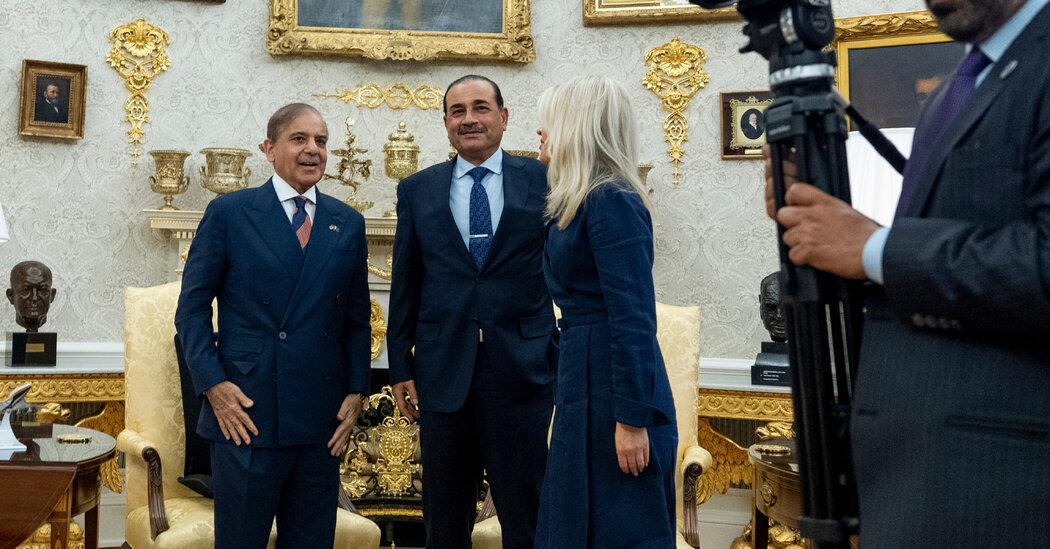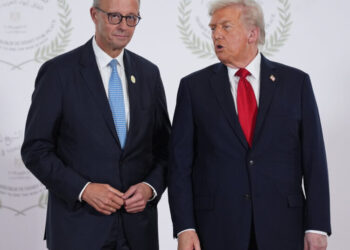
Pakistan signed a series of high-priced contracts with prominent Washington lobbying firms this spring, just weeks before the White House announced favorable new policies that gave the country one of the world’s more enviable tariff rates and an edge over its archrival, India.
The policy changes heralded a turnabout in Pakistan’s previously rocky relationship with the Trump administration and have largely been attributed to shrewd diplomacy by Islamabad, which has lavished President Trump with the kind of public accolades and big-ticket business deals he relishes.
But the lobbying contracts, which totaled millions of dollars and held out the promises of lower tariffs and access to Mr. Trump, suggest an additional reason for Pakistan’s improved standing: a campaign to influence the president, which included employing some of his closest confidants.
In April and May, as Pakistan ramped up its charm offensive, it spent at least three times as much as India on lobbying in Washington, according to contracts filed with the Department of Justice. As Islamabad rapidly hired lobbyists, including Mr. Trump’s former business partners and bodyguard, its relationship with the United States blossomed and India’s deteriorated.
Many factors may help explain India and Pakistan’s recent divergent trajectories. One is that Pakistan agreed to credit Mr. Trump with ending its military dispute with India in May and to nominate him for a Nobel Peace Prize. Prime Minister Narendra Modi of India refused to do either, arguing that U.S. involvement had nothing to do with the cease-fire. Islamabad also eagerly pitched what became a $500 million mineral extraction agreement and opened its markets to American farm goods.
But the timeline of events and the speedy U.S. warming toward Pakistan also coincides with the lobbying effort.
“You can sort of look at the dots connecting themselves,” said Michael Kugelman, formerly the director of the South Asia Institute at the Wilson Center, who added that Pakistan’s lobbying effort was one of several key factors in its turnaround.
“There were lobbyists charged with dealing with the tariff issue, then Pakistan’s tariffs come down,” he added. “There are lobbyists contracted to promote economic cooperation, then you have all this interest from the U.S. in critical minerals and energy.”
Over the course of a turbulent few weeks this spring, as the Trump administration raised tariffs on countries around the world and Pakistan found itself on the brink of war with India, Islamabad entered contracts with six Washington firms for nearly $5 million in eventual retainer fees.
Among the firms Pakistan hired was Seiden Law LLP, which subcontracted Javelin Advisors, a government relations venture. Javelin’s founders include George Sorial, a longtime Trump Organization executive, and Keith Schiller, Mr. Trump’s former bodyguard, who served as director of Oval Office operations during the first Trump administration.
A million-dollar contract signed between Pakistan and Seiden Law on April 8 promised “a mutually agreed upon number of meetings to enhance Pakistani-U.S. leadership level engagements at the White House.”
Another agreement with Javelin was inked on April 24, just two days after militants killed 26 people in a terrorist attack in India-controlled Kashmir, and Pakistan and India found themselves on a path to war.
Just weeks after the contracts were finalized, Field Marshal Syed Asim Munir, the senior-most leader in Pakistan’s powerful military, arrived in Washington, where he met the Javelin principals.
The following afternoon, June 18, Field Marshal Munir had a private lunch with Mr. Trump at the White House. It was a remarkable meeting: Pakistani Army chiefs had accompanied civilian leaders to presidential meetings, but there is no record of one meeting on his own with a president at the White House.
“We realized we needed to establish a channel at the most senior level,” Mr. Seiden said. Citing attorney-client privilege, he declined to discuss the details of the sit-down with the field marshal, but in a statement his firm said the Pakistanis credited it with its improved fortunes in Washington.
“Many people were instrumental in this that didn’t involve us,” Javelin Advisors said in a statement to The New York Times. “The Pakistani personnel told us we were instrumental in the progress made with the U.S. government.”
An official familiar with the discussions said Javelin approached one of the president’s aides to facilitate a meeting, but the lunch was ultimately organized by the National Security Council.
Pakistani Embassy officials did not respond to requests for comment about efforts to improve their relationship with the White House.
Anna Kelly, a White House spokeswoman, said in a statement that Pakistan has been a “vital partner” in countering “radical Islamic terrorism” since the start of the administration. Mr. Trump’s use of tariffs to “end the conflict between India and Pakistan,” she added, “enhanced the president’s positive relationship with Pakistani leaders.”
By the fall, Mr. Trump had called Pakistan’s army chief his “favorite field marshal” and the nation’s support for his Gaza peace plan “incredible.” It was a sharp turn for a country that Mr. Trump had said in his first term offered “nothing but lies and deceit.”
On April 2, President Trump announced a 29 percent tariff on Pakistani goods. Six days later — the same day it hired Seiden Law — Islamabad signed a deal with Orchid Advisors, a lobbying firm, which then subcontracted with the firm Squire Patton Boggs.
The contract with Orchid promised “direct advocacy efforts with the Trump administration regarding tariffs and trade” and to “reset the diplomatic, military and commercial relationship” between the countries.
Squire has employed the president’s former economic adviser Everett Eissenstat, and his former defense secretary, Mark Esper.
Four months after the contract was signed, Mr. Trump cut tariffs on Pakistan to 19 percent — one of the lower rates among major Asia economies — and increased India’s rate to 50 percent, in large part over President Trump’s frustration that it was still buying Russian oil.
In a statement, Squire said it “cannot comment on client engagements without their permission.”
Foreign governments paying American lobbyists to influence public officials is nothing new. Since 1938, the Foreign Agents Registration Act has compelled Americans working on behalf of foreign governments to register with the Department of Justice and publicly disclose contracts signed with them.
But at the same time that Pakistan was ramping up its campaign, the Trump administration was moving to loosen limits on foreign lobbying.Recently, Attorney General Pam Bondi, herself a former lobbyist, disbanded the Justice Department’s Foreign Influence Task Force, which prosecuted cases of influence peddling, and narrowed the enforcement of the Foreign Agents Registration Act.
India also hired new lobbyists in the spring, and ramped up its efforts in the summer as it was being outspent in Washington by Pakistan.
In April, India inked a deal with SHW Partners LLC, run by the longtime Trump adviser Jason Miller, who worked on all three of the president’s campaigns. That contract promised India “strategic counsel” and help building “government relations,” but does not specify particular areas.
And in August, India hired Mercury Public Affairs, whose partners include Danielle Alvarez, a former senior adviser to Mr. Trump’s 2024 campaign, and Bryan Lanza, the former communications director for Mr. Trump’s transition team. Susie Wiles, the White House chief of staff, was also formerly employed by the firm as a lobbyist.
The Indian Embassy did not respond to a request to comment.
Pranav Baskar is an international reporter and a member of the 2025-26 Times Fellowship class, a program for journalists early in their careers.
The post How Pakistan’s Spending Blitz Helped Win Over Trump and Flip U.S. Policy appeared first on New York Times.



